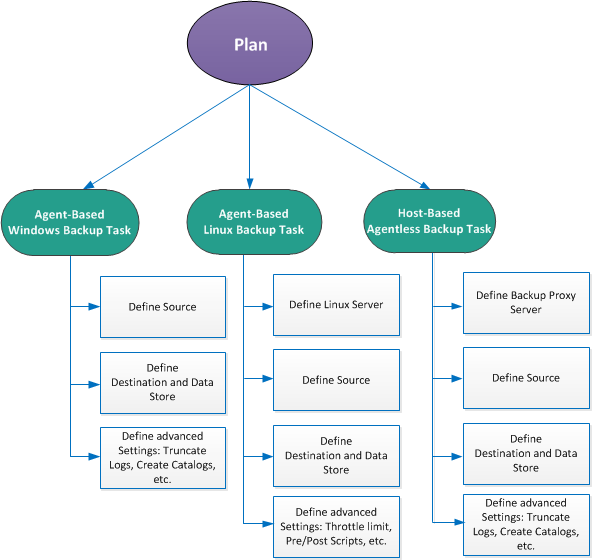Understanding Plan and Tasks
To protect a node, you need to create a plan with a backup task. A plan is a group of tasks to manage backup, replication, and creation of virtual standby nodes. A plan consists of a single or multiple tasks. Tasks are a set of activities to define the source, destination, schedule, and advanced parameters.
You can create the following tasks:
Backup Tasks
Lets you create a backup task to protect Windows, Linux, and host-based virtual machine nodes. Based on the type of nodes you want to protect, use one of the following backup tasks:
Agent-Based Windows Backup
Defines a backup task to protect Windows nodes. In an agent-based backup method, an agent component is used to back up data. The agent is installed on the source node.
Host-Based Agentless Backup
Defines a backup task to protect host-based virtual machines in a VMware vCenter/ESX or Microsoft Hyper-V server. In an agentless backup method, you do not need to install an agent component on either the server or the virtual machine. However, you have to install the agent on a proxy server.
Agent-Based Linux
Defines a backup task to protect Linux nodes. The agent is installed on a Linux Backup Server and not on the source nodes that you want to protect.
Replicate from a remote RPS task
Lets you create a task to receive data from a remote recovery point server.
Replicate task
Lets you create a task to replicate backup data from a recovery point server to another recovery point server.
Virtual Standby task
Lets you create a task to create a virtual standby node.
File Copy task
Lets you copy selected files from the source node and store the copied files in a local or shared folder. You can also store the files in a cloud storage.
Copy Recovery Points task
Lets you copy the recovery points to a local or shared folder or Cloud.
Replicate to a remotely-managed RPS task
Lets you create a task to replicate or send data to a remote recovery point server.
File Archive task
Lets you copy the recovery points to a network share, cloud storage, or volume on a protected node. When the recovery points get copied to the destination, the source files are deleted.
Copy to Tape task
Lets you copy the recovery points to a tape with granular recovery capability directly from tape.
Assured Recovery task
Lets you verify accessibility and assure recovery of the data.
The following table displays the list of follow-up tasks that you can add after Task 1:
|
Task 1 |
Follow-up Tasks |
|
Backup: Agent-Based Windows |
|
|
Backup: Host-Based Agentless |
|
|
Backup: Agent-Based Linux |
|
|
Replicate data from a remote RPS |
|
|
Backup: Office 365 Exchange Online |
|
|
Backup: Office 365 OneDrive |
|
|
Backup: Office 365 SharePoint Online |
|
|
Backup: Files on UNC or NFS Path |
|
The following diagram illustrates how different tasks form a backup plan. The diagram also shows parameters that you can define in each task.
